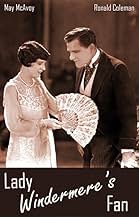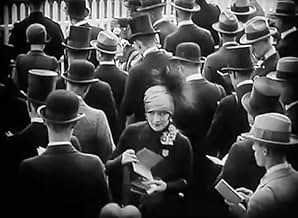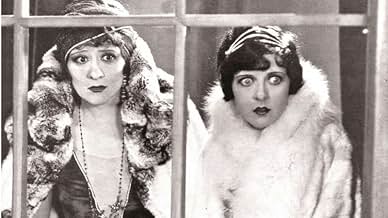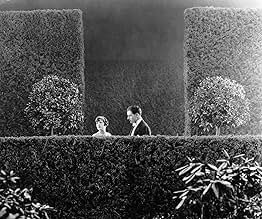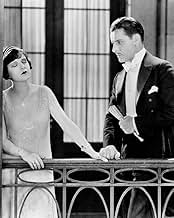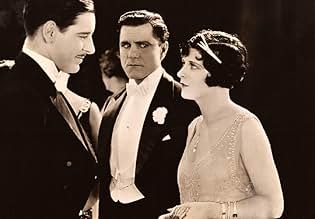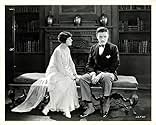IMDb RATING
7.2/10
1.5K
YOUR RATING
A society woman believes her husband is having an affair, a misconception which may have dire personal consequences for all involved.A society woman believes her husband is having an affair, a misconception which may have dire personal consequences for all involved.A society woman believes her husband is having an affair, a misconception which may have dire personal consequences for all involved.
- Awards
- 1 win total
Edward Martindel
- Lord Augustus Lorton
- (as Edw. Martindel)
Carrie Daumery
- The Duchess of Berwick
- (as Mme. Daumery)
Billie Bennett
- Lady Plymdale
- (uncredited)
Michael Dark
- Party Guest
- (uncredited)
Helen Dunbar
- Mrs. Cowper-Cowper
- (uncredited)
Frank Finch Smiles
- Waiter with Party Guest List
- (uncredited)
Larry Steers
- Party Guest
- (uncredited)
Ellinor Vanderveer
- Party Guest
- (uncredited)
Percy Williams
- Waiter at the Party
- (uncredited)
Featured reviews
"Lady Windermere's Fan" is a master class in silent film adaptation by Ernst Lubitsch of Oscar Wilde's play of the same name. Bringing one of Wilde's works, which are justifiably renowned for their clever word play, especially the epigrams, to the silent screen seems an act of folly, but no filmmaker at the time, and perhaps since, had a better sense of visual wit than Lubitsch--an appreciation that extended to the entire withdrawal of Wilde's epigrams from this adaptation, to be replaced largely by the sort of amusing visual gags and situations of the sophisticated romantic comedy, which was then just emerging in cinema, such as in Lubitsch's prior "The Marriage Circle" (1924), and, more specifically, that evolved into the comedy of remarriage genre.
Despite Wilde's caustic wit putting high society in its place, so to speak, the resolution of the play was a product of the Victorian morals and age in which it was written, especially in regards to the role of women as faithful wives and mothers and nothing else. Not only did Lubitsch update it to the modern Roaring Twenties in the sense that there were now automobiles instead of horse-drawn carriages, but he likewise updated its lapses into moralism with a farce that's playful to the end. Additionally, instead of preserving the play's not-so-surprising revelation that Mrs. Erlynne is Lady Windermere's mother, it announces this in Edith Erlynne's first scene; consequently, allowing for much of the humor and intrigue to be restructured around the dramatic irony of the spectator knowing what the characters do not. The updating also remakes Edith into something of a vamp or a flapper, including her wardrobe distinguishing her from the high-society clique. And, although she wishes to join their ranks, so as to marry, she also seems to relish the attention her appearance as a deviant brings her, especially from the opposite sex. I also find it amusing how she recklessly tosses her cigarettes aside rather than placing them in the ashtrays that are always nearby (two subsequent adaptations, "The Fan" (1949) and "A Good Woman" (2004), contain more obvious jokes based on Mrs. Erlynne's smoking). Although Irene Rich as Edith appears fourth in the credits, including below the star-in-the-making Ronald Colman as Lord Darlington, the play's cad, this is Rich's picture. Behind the screen, they must've known this, too, as she steals the show down to the delightfully-altered ending, although the supporting cast is quite amusing, too.
While having the unduplicated distinction of being the most prestigious director in two nations, Germany and, then, the U.S., and in both the silent and sound eras, both critically and in terms of studio clout, it doesn't seem that Lubitsch receives as much appreciation nowadays as do some other filmmakers of his era. Regardless, his "touch" is evident here, from the smart adaptation, well-crafted pacing, grand set design and the peerless comedic timing. And, this was Lubitsch's picture, as Warner Bros. gave him the rare artistic freedom for studio productions, from story selection to final cut. The original racetrack scene is a brilliant series of looks, of binocular-masked point-of-view shots and reverse angles, as Lubitsch parodies society's busybodies cackling over the sight of Edith. Throughout the picture, this system of looks is repeated in scenes where characters peer out windows. At the end of the racetrack scene, there's also a creative shot of Edith passing an "Exit" sign, as Lord Lorton follows her and a wipe closes out the scene just at the right point. Another shot relies for its comedic effect on no camera movement or editing and entirely upon how Lady Windermere re-enters the shot as she debates whether to search her husband's desk drawer.
This would be a rich film to study for its more technical aspects alone: the editing, camera placement, production design, blocking. The garden scene in the party sequence is another good example of this--how the obscuring of the spectator's view of Lady Windermere and Lord Darlington's interaction adds comedic effect while that of Edith's interaction as witnessed by Lady Windermere compounds the dramatic irony. Additionally, Lubitsch was once derisively called the "director of doors" by Mary Pickford, due to their contentious collaboration on "Rosita" (1923), and there's good, if at first seemingly puzzling, reason for the moniker. I believe his emphasis on doors is the backbone of the films' pacing, the movement of the characters and the edits. Even though he insisted on always showing characters enter and exit every door, this film has a decent average shot length of 7.4 seconds, which is also surely helped by the sparing use of intertitles. And those title cards tend to add to the farce, such as the scene focusing on the relation of a gentleman to a lady being indicated by the manner in which he rings her doorbell, which is doubly humorous when considering the director's already-established fascination with the entryways, that he now is diving into their detail with doorbells. Even when a shot seems at first to linger needlessly on the sight of a door being opened and closed, such as when Lady Windermere leaves the garden, it serves a purpose; in that case, it anticipates Edith's following her. It also helps that the doors tend to be absurdly gigantic, with doorknobs sometimes reaching near faces. The enormous sets in general, when aided by well-timed long-shot framings, add literalism to the satirical smallness of the characters amid high-handed society and personal shortcomings.
It's also notable that Lubitsch and company also adapted a 1916 version of the same story and reworked some of its alterations in "opening up" what was originally a three-sets and four-acts play. Film historian Charles Musser goes into some detail comparing the two in the essay, "The Hidden and the Unspeakable: On Theatrical Culture, Oscar Wilde and Ernst Lubitsch's Lady Windermere's Fan." The 1916 film, however, is primitively filmed from distant camera positions, bogged down by wordy title cards, with histrionic acting and more moralizing than even in Wilde's original, but without the satire. This 1925 iteration improves on all of this: an intricate use of the camera based on looks--what characters see and misbelieve they see--, nuanced performances that are allowed to display the registering of character thoughts though a more intimate camera and a pacing that is patient and yet remains energetic, lush settings and aided by the translating of the written witticisms into visual wit.
Despite Wilde's caustic wit putting high society in its place, so to speak, the resolution of the play was a product of the Victorian morals and age in which it was written, especially in regards to the role of women as faithful wives and mothers and nothing else. Not only did Lubitsch update it to the modern Roaring Twenties in the sense that there were now automobiles instead of horse-drawn carriages, but he likewise updated its lapses into moralism with a farce that's playful to the end. Additionally, instead of preserving the play's not-so-surprising revelation that Mrs. Erlynne is Lady Windermere's mother, it announces this in Edith Erlynne's first scene; consequently, allowing for much of the humor and intrigue to be restructured around the dramatic irony of the spectator knowing what the characters do not. The updating also remakes Edith into something of a vamp or a flapper, including her wardrobe distinguishing her from the high-society clique. And, although she wishes to join their ranks, so as to marry, she also seems to relish the attention her appearance as a deviant brings her, especially from the opposite sex. I also find it amusing how she recklessly tosses her cigarettes aside rather than placing them in the ashtrays that are always nearby (two subsequent adaptations, "The Fan" (1949) and "A Good Woman" (2004), contain more obvious jokes based on Mrs. Erlynne's smoking). Although Irene Rich as Edith appears fourth in the credits, including below the star-in-the-making Ronald Colman as Lord Darlington, the play's cad, this is Rich's picture. Behind the screen, they must've known this, too, as she steals the show down to the delightfully-altered ending, although the supporting cast is quite amusing, too.
While having the unduplicated distinction of being the most prestigious director in two nations, Germany and, then, the U.S., and in both the silent and sound eras, both critically and in terms of studio clout, it doesn't seem that Lubitsch receives as much appreciation nowadays as do some other filmmakers of his era. Regardless, his "touch" is evident here, from the smart adaptation, well-crafted pacing, grand set design and the peerless comedic timing. And, this was Lubitsch's picture, as Warner Bros. gave him the rare artistic freedom for studio productions, from story selection to final cut. The original racetrack scene is a brilliant series of looks, of binocular-masked point-of-view shots and reverse angles, as Lubitsch parodies society's busybodies cackling over the sight of Edith. Throughout the picture, this system of looks is repeated in scenes where characters peer out windows. At the end of the racetrack scene, there's also a creative shot of Edith passing an "Exit" sign, as Lord Lorton follows her and a wipe closes out the scene just at the right point. Another shot relies for its comedic effect on no camera movement or editing and entirely upon how Lady Windermere re-enters the shot as she debates whether to search her husband's desk drawer.
This would be a rich film to study for its more technical aspects alone: the editing, camera placement, production design, blocking. The garden scene in the party sequence is another good example of this--how the obscuring of the spectator's view of Lady Windermere and Lord Darlington's interaction adds comedic effect while that of Edith's interaction as witnessed by Lady Windermere compounds the dramatic irony. Additionally, Lubitsch was once derisively called the "director of doors" by Mary Pickford, due to their contentious collaboration on "Rosita" (1923), and there's good, if at first seemingly puzzling, reason for the moniker. I believe his emphasis on doors is the backbone of the films' pacing, the movement of the characters and the edits. Even though he insisted on always showing characters enter and exit every door, this film has a decent average shot length of 7.4 seconds, which is also surely helped by the sparing use of intertitles. And those title cards tend to add to the farce, such as the scene focusing on the relation of a gentleman to a lady being indicated by the manner in which he rings her doorbell, which is doubly humorous when considering the director's already-established fascination with the entryways, that he now is diving into their detail with doorbells. Even when a shot seems at first to linger needlessly on the sight of a door being opened and closed, such as when Lady Windermere leaves the garden, it serves a purpose; in that case, it anticipates Edith's following her. It also helps that the doors tend to be absurdly gigantic, with doorknobs sometimes reaching near faces. The enormous sets in general, when aided by well-timed long-shot framings, add literalism to the satirical smallness of the characters amid high-handed society and personal shortcomings.
It's also notable that Lubitsch and company also adapted a 1916 version of the same story and reworked some of its alterations in "opening up" what was originally a three-sets and four-acts play. Film historian Charles Musser goes into some detail comparing the two in the essay, "The Hidden and the Unspeakable: On Theatrical Culture, Oscar Wilde and Ernst Lubitsch's Lady Windermere's Fan." The 1916 film, however, is primitively filmed from distant camera positions, bogged down by wordy title cards, with histrionic acting and more moralizing than even in Wilde's original, but without the satire. This 1925 iteration improves on all of this: an intricate use of the camera based on looks--what characters see and misbelieve they see--, nuanced performances that are allowed to display the registering of character thoughts though a more intimate camera and a pacing that is patient and yet remains energetic, lush settings and aided by the translating of the written witticisms into visual wit.
An epigram-less silent screen version of Oscar Wilde by Ernst Lubitsch is likely to be a contest rather than a collaboration (and not surprisingly Lubitsch wins).
Irene Rich's handsome profile in the role of Mrs Erlynne provides a sight to savour throughout, and the race meet at which we see her from constantly switching viewpoints as people study her through their binoculars is one of the visual & cinematic highlights of the film.
Irene Rich's handsome profile in the role of Mrs Erlynne provides a sight to savour throughout, and the race meet at which we see her from constantly switching viewpoints as people study her through their binoculars is one of the visual & cinematic highlights of the film.
'Lady Windermere's Fan' is one of the great plays of Oscar Wilde, so it is curious to see it here as a big budget silent film from Warners Brothers. Starring May McAvoy and Bert Lytell as the Windermeres, with Irene Rich as Mrs Erlynne and a young Ronald Colman as Lord Darlington, this film is directed by Ernst Lubitsch, known mainly now for his stylish musicals and dramas from the sound era.
Despite the obvious drawback of not using any of Wilde's text, either spoken or as title cards, this adaptation does succeed in putting across most of the play's plot, just making a little tweak here and there to move the plot along or to bring matters to a satisfactory conclusion. Sets and costumes are of the jazz age and are beautiful, and McAvoy is a winsome Lady Windermere, all indignant eyes and little rosebud mouth.
The film however belongs to Irene Rich who portrays Mrs Erlynne as desperate, calculating, and everything in-between. She was a superb technician without overacting, and it's a pleasure to watch her. Ronald Colman as well shows signs of the star quality to come.
This 'Lady Windermere' is well worth watching.
Despite the obvious drawback of not using any of Wilde's text, either spoken or as title cards, this adaptation does succeed in putting across most of the play's plot, just making a little tweak here and there to move the plot along or to bring matters to a satisfactory conclusion. Sets and costumes are of the jazz age and are beautiful, and McAvoy is a winsome Lady Windermere, all indignant eyes and little rosebud mouth.
The film however belongs to Irene Rich who portrays Mrs Erlynne as desperate, calculating, and everything in-between. She was a superb technician without overacting, and it's a pleasure to watch her. Ronald Colman as well shows signs of the star quality to come.
This 'Lady Windermere' is well worth watching.
In "Lady Windermere's Fan" the great Ernst Lubitsch may have bitten off a bit more than he can chew. First and foremost, how can you reproduce Oscar Wilde's witty dialogue in a SILENT FILM?? True, the famous 'Lubitsch touch' is apparent, but minus Wilde it becomes a romantic drama.
The players are excellent and above reproach, in particular Irene Rich as Mrs. Erlynne - in fact, it is basically her picture. A youthful Ronald Colman as Lord Darlington underplays his role but is urbane and charming (in truth, I have not read or seen the play before but that is my perception). I have always liked Colman in everything I have seen him in, but, of course, you can't hear his marvelous voice and diction here.
Despite these drawbacks I enjoyed the film and felt the photography was exceptionally good. I just felt it would have been even better with a soundtrack, as it lacks the requisite bite and panache.
Sadly, a drawing room comedy of manners such as "Lady Windermere's Fan" wouldn't work today, as modern day audiences would be baffled by the subtlety and lack of action. That may be why it hasn't been remade successfully in the sound era. I give it a rating of 7.
The players are excellent and above reproach, in particular Irene Rich as Mrs. Erlynne - in fact, it is basically her picture. A youthful Ronald Colman as Lord Darlington underplays his role but is urbane and charming (in truth, I have not read or seen the play before but that is my perception). I have always liked Colman in everything I have seen him in, but, of course, you can't hear his marvelous voice and diction here.
Despite these drawbacks I enjoyed the film and felt the photography was exceptionally good. I just felt it would have been even better with a soundtrack, as it lacks the requisite bite and panache.
Sadly, a drawing room comedy of manners such as "Lady Windermere's Fan" wouldn't work today, as modern day audiences would be baffled by the subtlety and lack of action. That may be why it hasn't been remade successfully in the sound era. I give it a rating of 7.
Nobody was as savvy about the intricacies of the human heart as Lubitsch, and of how virtue is never an absolute.
This warmly empathetic, highly sophisticated gem is an adaptation of Oscar Wilde, with virtually none of the play's dialog utilized, but as suggestive and outrageous as Wilde himself, conceived, framed and edited as pure cinema.
From the exact same period as Cecil B. DeMille's infinitely more crass sex comedies and Charles Chaplin's equally brilliant and morally ambiguous 'The Woman of Paris', but carried by an indistinguishably European sensibility. Irene Rich as the woman who sacrifices herself in secret is impossibly glamorous and subtle, May McAvoy is truly heartbreaking as the socialite suspicious of her husband's philandering, but Ronald Colman, alas, is left with nothing much to do except smolder sexily at the fringes with those impertinently raised eyebrows.
A highlight is the Ascot game, a marvel of choreography and mime, a delicious baiting of upper class hypocrisy.
This warmly empathetic, highly sophisticated gem is an adaptation of Oscar Wilde, with virtually none of the play's dialog utilized, but as suggestive and outrageous as Wilde himself, conceived, framed and edited as pure cinema.
From the exact same period as Cecil B. DeMille's infinitely more crass sex comedies and Charles Chaplin's equally brilliant and morally ambiguous 'The Woman of Paris', but carried by an indistinguishably European sensibility. Irene Rich as the woman who sacrifices herself in secret is impossibly glamorous and subtle, May McAvoy is truly heartbreaking as the socialite suspicious of her husband's philandering, but Ronald Colman, alas, is left with nothing much to do except smolder sexily at the fringes with those impertinently raised eyebrows.
A highlight is the Ascot game, a marvel of choreography and mime, a delicious baiting of upper class hypocrisy.
Did you know
- TriviaOne of the 50 films in the three-disk boxed DVD set called "More Treasures from American Film Archives, 1894-1931" (2004), compiled by the National Film Preservation Foundation from five American film archives. This film is preserved by the Museum of Modern Art, has a running time of 89 minutes and an added piano music score.
- Quotes
Opening title card: Lady Windermere faced the grave problem of seating her dinner guests.
- ConnectionsFeatured in Historia del cine: Epoca muda (1983)
- How long is Lady Windermere's Fan?Powered by Alexa
Details
- Release date
- Country of origin
- Language
- Also known as
- Lady Windermere's Fan
- Filming locations
- Toronto, Ontario, Canada(Racetrack Scene)
- Production company
- See more company credits at IMDbPro
Box office
- Budget
- $320,000 (estimated)
- Runtime2 hours
- Sound mix
- Aspect ratio
- 1.33 : 1
Contribute to this page
Suggest an edit or add missing content

Top Gap
By what name was L'éventail de Lady Windermere (1925) officially released in Canada in English?
Answer
